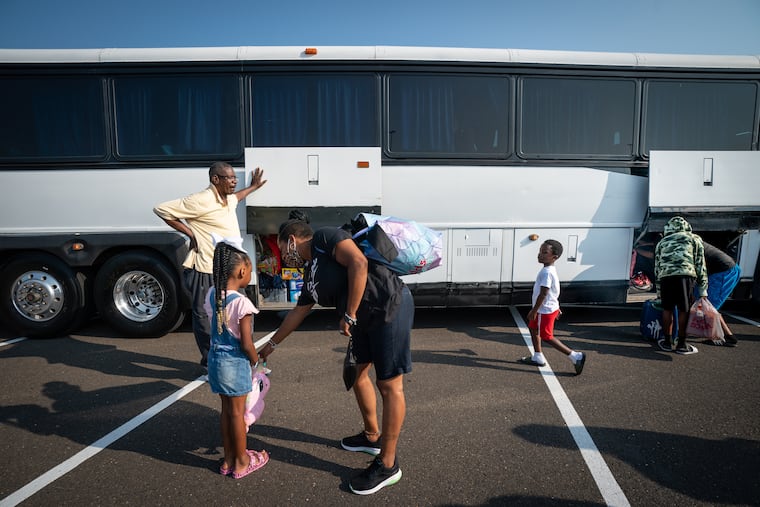Philly doesn’t need to reinvent the wheel to reduce homicides | Opinion
Every single time my children walk out the door of our Olney home, I pray that they make it back in.

I am a Philadelphian, born and raised, who unapologetically loves this city in all its glory and ailments. I am a wife and mother of an 18-year-old son and a 13-year-old daughter. I pray every single time they walk out the door of our Olney home that they make it back in.
I often wonder, how did we get here — ending August with 357 homicides, on track to be our deadliest year recorded for shooting deaths? I wonder if the outrage and call to action would be different if 350 Philadelphians were killed in a mass shooting — if someone or some group shot 350 people at a local school, or a disgruntled worker killed 350 employees in a downtown office building. Would the response from our leaders, the outrage, the compassion for victims’ families, be different? I think so. I believe city leadership understands that 350 homicides in under a year is a crisis and deserves attention. They are trying to address it. But we all know where the road of good intentions leads to, and there still remains some complacency.
» READ MORE: In Philly, someone has been shot every day since Jan. 2 as multiple crises plague the city | Editorial
Other cities, like New York and Oakland, Calif., have been where we are today but made improvements. We don’t need to reinvent the wheel. A report published last year by John Jay College of Criminal Justice’s Research and Evaluation Center, authored by a diverse group of academic consultants, lays out a framework for action I believe we can apply in Philadelphia
Here’s how I see Philly adapting their seven-part framework to our city:
1. Improve the physical environment. Memes and photos shared on social media frequently show blocks of Kensington strewn with trash and filth. How can businesses along that corridor thrive? What about the health risks to people who live in that neighborhood? People respond to their environment, as shown in recent research finding that home repairs can reduce violence. If we want to improve the conditions of our city, we need to clean it routinely and provide resources.
» READ MORE: Philly’s violence crisis can be reduced by tackling our housing repair crisis | Editorial
2. Strengthen anti-violence social norms and peer relationships. Philly has several organizations on the ground offering outreach and peer support. But they aren’t supported financially to help sustain their work. They do the most with little. There needs to be a collective approach to reaching those they serve.
3. Engage and support youth. As the John Jay report states, “Young people, especially young males, account for a disproportionate amount of community violence” — noting the value of youth employment, job mentorship and training, educational supports, and behavioral interventions. In our city, barbershops, beauty salons, and recreation centers are great hubs where young people congregate.
4. Reduce substance abuse. The city has forged partnerships and is taking a holistic approach to addressing substance abuse. Responses to the opioid epidemic should expand outreach to all drug dependencies (including crack and cocaine).
5. Mitigate financial stress. COVID-19 exposed America’s well-known secret: Millions of people are a paycheck or two away from homelessness. Many lost work and could not get their unemployment benefits paid, stuck in a quagmire of bureaucratic red tape. The John Jay report found: “People experiencing negative income shocks are less inclined to behave violently when they receive timely financial assistance.” The city has implemented resources like rental assistance and small-business programs that should outlast the pandemic.
» READ MORE: My friend carries a Glock and it’s OK with me — but Pa.’s latest gun bill is not | Opinion
6. Reduce the harmful effects of the justice process. Community members should be able to collaborate with law enforcement in reducing violence. Police should actively engage with the community they want to serve. Particularly in neighborhoods greatly impacted by violence, officers should be required to “walk the beat” or ride their bikes — be a constant presence.
7. Confront the gun problem. For Philly, this means answering these questions and letting those answers drive policy: Where are they coming from? How are they coming into the city? What other agencies can we work with? How can we approach this issue across local, state, and federal levels?
At the end of the day, I’m a wife and a mom working to keep my family safe. But I am also a public servant, one who hears the cries of my community daily and seeks resources to help parents bury their children lost to violence. I see the best this city has to offer, and the worst. I’ve listened to folks at their wit’s end during the closing of their businesses that they either worked for or owned. The city’s leadership can do much better. The communities can do much more if given backing. We need resources, leadership, and commitment from all levels of government to assist us in ensuring our neighborhoods are safe.
Felicia Parker-Cox is a district director in the U.S. House of Representatives and committeewoman in the 61st Ward/1st Division.